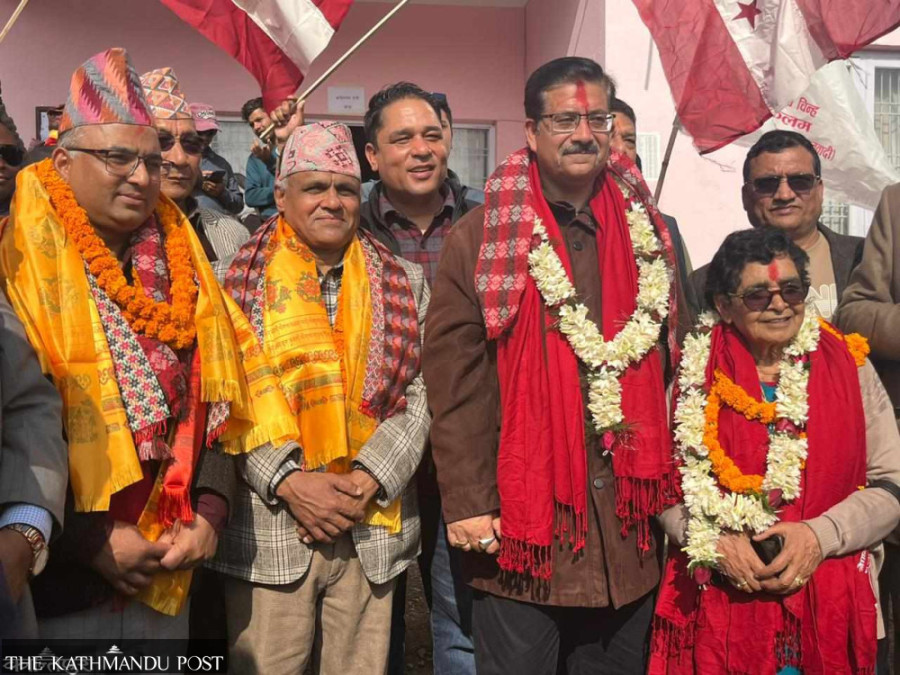Politics
National Assembly candidacies fuel discontent in ruling coalition, Congress
Senior Congress leaders express dissent. Alliance partner Janamat Party revolts by fielding two candidates.
Post Report
Amid growing dissatisfaction within the ruling alliance and inside Nepali Congress over the selection of candidates for the upcoming upper house elections, as many as 52 candidates across the country filed their nominations for the 19 seats on Monday.
Four Nepali Congress leaders including the general secretaries duo, Gagan Thapa and Bishwa Prakash Sharma, have registered their “notes of dissent” over the party’s pick of candidates.
Similarly, the Janamat Party, a fringe party that supports the ruling coalition but was denied even a single seat in the upper house, has revolted against the coalition by fielding its own candidates in Madhesh and Lumbini provinces.
The Humla district unit of the CPN (Maoist Centre) also expressed its reservations over candidate selection and announced a boycott of the election, which is scheduled for January 25.
The terms of 20 lawmakers in the 59-strong upper house expire on March 3. While 19 seats will be filled through elections, one member will be nominated by the President at the Cabinet’s recommendation.
The main opposition CPN-UML, however, picked its 19 candidates without any dispute. Nevertheless, the election has stirred discontent in the largest party, the Nepali Congress. The party announced its candidates for the election late in the afternoon on Monday amid differences between two rival camps led by party President Sher Bahadur Deuba, and Shekhar Koirala and Gagan Thapa.
General secretaries duo Thapa and Sharma, and two other leaders—Arjun Narsingh KC and Bal Bahadur KC—also registered their separate “notes of dissent” over the party’s selection of candidates.
One major dissatisfaction in Congress is over the selection of Krishna Prasad Sitaula from Koshi Province, a leader close to Deuba said.
“The party president had promised Sitaula a place in the National Assembly in exchange for his support in helping Deuba become party president in the last general convention. So we agreed to his nomination,” the leader said.
Sitaula had lost the parliamentary election from Jhapa to Rastriya Prajatantra Party chief Rajendra Lingden.
Leader Koirala, however, supported Sitaula’s nomination considering the latter’s role in the peace process and constitution-making. General Secretary Sharma also echoes Koirala.
Koirala added that there has been an agreement between Deuba and Prime Minister Dahal to elect Sitaula as next chairman of the National Assembly.
“Sitaula will lead the upper house in order to complete the remaining tasks of the peace process,” General Secretary Sharma told the Post.
The term of the present chairman, Ganesh Prasad Timilsina, will expire on March 3.
Similarly, the candidacy of Anand Prasad Dhungana of Madhes Province has courted controversy.
The two general secretaries have expressed their reservations against Dhungana’s candidacy arguing that he does not truly represent the sentiments and spirit of the Madhesi people just because he is from Dhanusha district.
“Although the representation of caste, class, region and people who have made special contributions, and experts in various fields of national life was envisioned in the National Assembly, that did not happen in the selection of candidates,” Thapa said in this note of dissent, adding, “Our constitution envisages the representation of castes, classes and regions that are not represented in the National Assembly... It also emphasises the presence of experts who have made special contributions in various fields of national life.”
Of the ten seats the coalition allocated Congress, the party picked seven candidates from the Deuba group while the remaining three came from the dissident Koirala-Thapa group. Although the rival camp had demanded four seats, it was allotted three seats.
General Secretary Thapa, however, said he would respect the party’s majority-based decision despite the reservations.
Similarly, Sharma, the other general secretary, reacting to the overall selection of candidates, said he is not happy with the party president’s work approach.
As per the Nepali Congress charter, the selection of the candidates should be decided by the party parliamentary board. But Deuba has not given full shape to the party parliamentary board.
“How can the party’s office bearers take such crucial decisions?” Sharma said while stressing the need for .
The Nepali Congress also should be diligent in maintaining the distinctiveness of the national assembly, said Sharma, adding that the principle of inclusiveness should not only be a mere provision in the party but a guiding principle in reality.
The KC duo in their note of dissent said the selection of the candidates violates the criteria set by the party’s central working committee. They pointed at ‘mistakes and procedural lapses” in candidate selection, which they said ignores the constitutionally guaranteed principle of inclusiveness.
Some members of the ruling alliance, especially the fringe ones, are equally dissatisfied over the allocation of upper house seats.
The CPN (Unified Socialist) was aiming for seats, but is now forced to settle for two. After being denied even a single seat, the Tarai-based Janamat Party fielded Ram Shankar Mahaseth from Madhesh and Bal Govinda Chaudhary in Lumbini.
“People are frustrated by the monopoly of the four ruling parties, which are bent on capturing all state organs,” Janamat Party chief CK Raut said at an interaction in Bhaktapur.




 13.12°C Kathmandu
13.12°C Kathmandu













